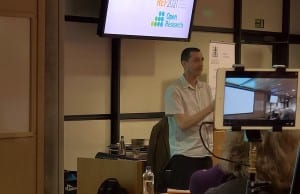 A qualitative study exploring the experiences and perceptions of informal carers of people with dementia when interacting with health care services was published this month in the journal Dementia. The study entitled ‘Caregivers’ interactions with health care services – Mediator of stress or added strain? Experiences and perceptions of informal caregivers of people with dementia – A qualitative study’ was undertaken by Despina Laparidou (lead author), Dr Jo Middlemass, Professor Terence Karran and Prof Niro Siriwardena.
A qualitative study exploring the experiences and perceptions of informal carers of people with dementia when interacting with health care services was published this month in the journal Dementia. The study entitled ‘Caregivers’ interactions with health care services – Mediator of stress or added strain? Experiences and perceptions of informal caregivers of people with dementia – A qualitative study’ was undertaken by Despina Laparidou (lead author), Dr Jo Middlemass, Professor Terence Karran and Prof Niro Siriwardena.
 The study explored carers’ unmet needs for both information/knowledge about dementia and support from healthcare services. The researchers found that carers would greatly benefit from detailed information on disease progression, guidelines and tips on dealing with challenging behaviours, as well as information on financial and legal advice. Carers also felt that health and social care services are often fragmented, making it harder for them to receive the support they need and want.
The study explored carers’ unmet needs for both information/knowledge about dementia and support from healthcare services. The researchers found that carers would greatly benefit from detailed information on disease progression, guidelines and tips on dealing with challenging behaviours, as well as information on financial and legal advice. Carers also felt that health and social care services are often fragmented, making it harder for them to receive the support they need and want.
 At the same time, healthcare professionals stated that while they have a theoretical knowledge of the disease, they felt they often lack knowledge of how it is to live with dementia, which can make it difficult to know how best to support carers. Another interesting finding of the study was that having carers keep a daily diary of symptoms and behaviour could help to empower carers and facilitate communications with healthcare professionals.
At the same time, healthcare professionals stated that while they have a theoretical knowledge of the disease, they felt they often lack knowledge of how it is to live with dementia, which can make it difficult to know how best to support carers. Another interesting finding of the study was that having carers keep a daily diary of symptoms and behaviour could help to empower carers and facilitate communications with healthcare professionals.
The research team hopes to expand this study and develop an educational intervention for informal carers of people with dementia.
By Despina Laparidou
















